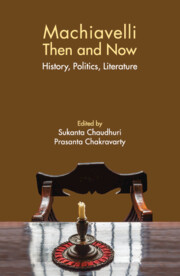1 - Introduction
Published online by Cambridge University Press: 21 January 2022
Summary
Niccolo Machiavelli is an idea, an enduring author-function. In no other time is this idea more relevant than in ours. But in order to reassess this function, we have to place Machiavelli in his historical context. We are forever perplexed by the twin threads of profound admiration and lasting unease in the reception of his methods and writings. Was Machiavelli the first detached empiricist in matters political and artistic? Or did he simply refine and reinvent certain genres of expression, including modern forms of treatises and letters? Was he a punctilious realist, a neutral strategist—no more, no less? Or is it his patriotism that actually shines forth as he repeatedly emphasizes solidarity, cohesion, and order in public discourse? Was not Machiavelli also the forerunner of the argumentative modern citizen who cries out against slavery and political bondage to the will and dominion of rulers, however benign? Or should we refrain from taking his radical solutions at face value and instead view his texts and tales as satirical and cautionary? What about the moral force of Machiavelli's pronouncements? Or is he one of the originary voices to have helped usher in the modern ideal of value-neutrality? Are his methods of amalgamating the past with the contemporary so unique that they come across as visionary and fantastical?
The idea of Machiavelli forces us to wrestle with difficult issues of moral strength, magnanimity, suasion, vigour, vitality, public spirit, civic sense, dedication, glory, expansion, and the patria. At the same time, he is also profoundly and uniquely identified with a certain solitude and detachment, even as he grapples at close quarters with the most pressing diplomatic and political questions of his time. But most of all, it is evident that he places a powerful wager on verità effettuale, truth tested by success and experience (though Antonio Gramsci had stated long ago that the effectual reality is never static, but an outcome of relations of force that alter the meaning of a project, and John McCormick calls such a truth ‘elusive’). As Isaiah Berlin puts it, for Machiavelli effectiveness and order must always precede ozio, quietism, and indolence.
- Type
- Chapter
- Information
- Machiavelli Then and NowHistory, Politics, Literature, pp. 1 - 18Publisher: Cambridge University PressPrint publication year: 2022



